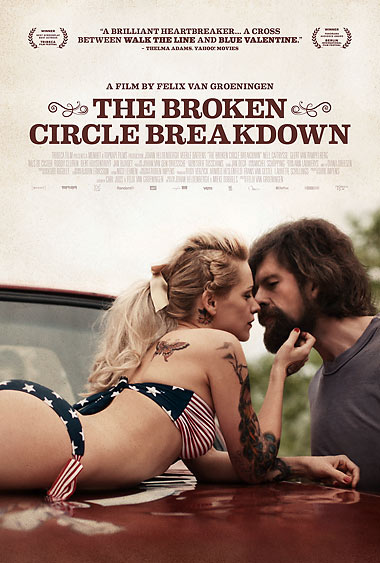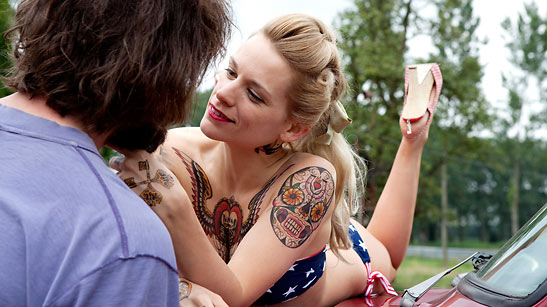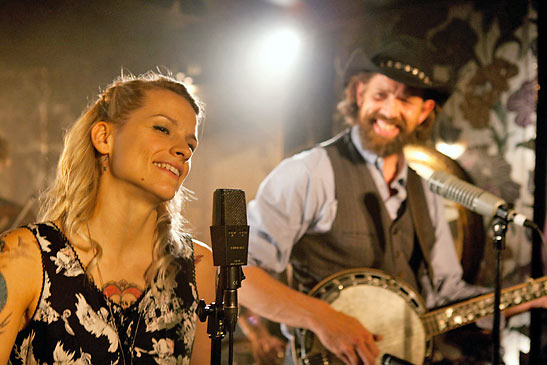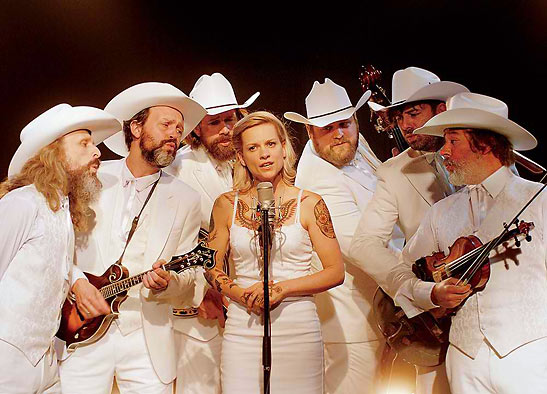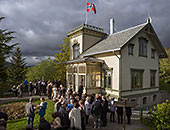 |
 |
|
 |

|
Writer/Actor/Musician
Johan Heldenbergh On "The Broken Circle Breakdown" – Belgium's Foreign Language Oscar Entry By Beverly Cohn
Your reporter recently sat down with Johan for an in-depth, personal, exclusive interview and the following has been edited for content and continuity. After seeing many of the film entries for Best Foreign Language film, in my opinion, your film is hands down the best and I hope it wins? Johan: It's very nice of you to say so. We're very proud of the movie, of course. Are you exhausted from this press trip? Johan: I've got a couple of ulcers. I was very tired coming here because the last few months have been dreadful. I broke up with my girlfriend after a 20-year relationship. She's the mother of my children. I've known her since we were very young. We met at school and now it's over. This is tough stuff. Is it a relationship that can be restored? Johan: I'm not certain. I have a new girlfriend now and we'll see how that evolves.
Does the story line with your character of Didier and Elise (Veerle Baetens) parallel your personal situation? Johan: At this time of my life, it's very painful. When I saw the movie in Berlin, and the break-up between the two characters, I said this is the last time I will see this movie because the character is too close to myself and Elise is too close to my former girlfriend. This is a delicate story and in the hands of less talented people, it could have been very maudlin so it's a tribute to all of you that it in some ways it's life affirming in that you can come out on the other side of the tragedy, but not necessarily where you thought you were going to be. Would you agree? Johan: That sounds very accurate and it's funny that you say so. When Felix (director) started talking to me about making a movie based on the theatre play, I said that there is a movie in there, but be aware that there are twenty-four very bad movies and there's one very good one and it's your job to find the good one because it's very dangerous to just go into the melodrama and put the emphasis on the child.
Did you think you manifested your original intention to write a play with a political statement without the soapbox? Johan: You said soapbox and I always refer to the soapbox thing. I wanted to make a political statement. I want to say to people I'm scared right now. When I start writing, I always start with a political point of view. For example, my last play was about the politics in Belgium, but then the story took over and with "The Broken Circle Breakdown" it was the same. I wanted to write something about religion and then I chose Bluegrass music as a mirror and if you listen to the music, it dictates the story. Would you listen to the music and then write? Johan: There were a few songs like Bill Monroe's "Blue Yodel #5" with the lyric "Mom is not dead, she's only sleeping," and "If I Needed You" by Townes Van Zandt and after listening to those two songs, I felt I must invent the saddest story I can imagine. At the time, I was already in a mental break-up with my former girlfriend so I just started writing and all of a sudden I felt that we should have a little girl and she should be called Maybelle and she dies. Technically, I'm responsible for the structure and 90% of the text, but Mica, who co-wrote the play with me, is responsible for the most beautiful 10%. She added the female voice. Were you politically motivated to write the character of Maybelle? Johan: Yes. I wanted to say something about the Bush veto of stem cell research. It was a year before I wrote the play, but it was constantly on my mind. I kept thinking how could he do that? Because of the influence of the extreme right wing faction of the Republican party. Johan: I'm not here to criticize any American president. This is the European point of view, of course. I don't live in America, but in Europe, we were scared at that time because of the war on terror and the axis of evil. All these words came across the ocean and it was very frightening. I guess that's how Maybelle took over the story. Could you elaborate a bit more? Johan: I was raised as a Catholic boy and there's a creed in the Catholic Church: "I believe in God, the Father Almighty, Creator of heaven and earth; and in Jesus Christ, His only Son, our Lord, who was conceived by the Holy Spirit, born of the Virgin Mary…" etc. My religious teacher would say think about what you're saying and believe what you're saying. But by the time I was ten years old, it didn't make sense to me. I grew up as a person very much involved and influenced by religion and the Catholic Church and was trying to be a good person, which I think I am. But when I became an atheist that was my liberty in thought. You had the Americans with their very strict Christian religions and on the other side Islam. I wanted to get the message across that it doesn't matter what you believe and what you need in your life as religion, but that it's important that you give that same freedom to others. I find it strange that people think that if you don't believe in God, you're a bad person or don't have morals. I'm a very moral guy. I believe in being good, in gratitude, and love. How was the transition from the play to the film version? Johan: That's a big question and there are a lot of answers. First of all, I played the part of Didier 150 times in the theatre and it was hard. The performances were Wednesday, Thursday, Friday, Saturday, and every Sunday morning I was at the breakfast table with my children and I'd be crying. I'm an actor guy. You have to be the character, but you don't have to take the misery home, but it was too hard not to. Let's throw away modesty. I was very good and it was my story. Then Felix decided to make a movie and I said that I was sorry, but I couldn't be part of the changes that were going to be made. Just give me the changes and I'll give you my opinion. Was something in the film version that you wished was not in there and/or was something not there that you wished was included? Johan: Yes. There are two things. The scene with the dead bird when he tells Maybelle the bird has to be in the bin (garbage can) because she can't throw it in the green (compost). That's something I imagine that Didier would never say. He would understand and it was very hard for me to say that line because it made Didier harder and tougher than in the play. The second thing is they threw away the first monologue that Didier does and for me there was a crescendo as an actor in the second monologue where I shout out about God. I think it throws people off because it's too much of a surprise because it comes out of nowhere. I talked to Felix about it and he made it very clear that it had to be cut and he's right. How did your philosophy as an actor help you bridge acting in the play vs. the film. Johan: I very strongly believe that you have to be in the moment and don't bring a lot of luggage with you. I always say to myself you are right here, right now, and you are doing a movie, and this is the scene. You're going to do it and don't think about anything else. Sometimes it's hard, but I had to forget about the play. As a wordsmith, did you cringe when you saw some of your beautiful writing deleted? Johan: Yes, but I promised myself that I would give Felix 100% freedom because if it was me, I would demand 100% freedom. I have a theory that very much suits me as an actor called the "four subjectives." The first one is the writer who writes the story, the second one is the director who tells the story in images and should have the freedom to throw away his respect for the writer; the third subjective is that the actor should have the freedom to make his own story and then you have three stories all together which makes something rich, and then the fourth objective is the audience which can look at the story in different ways. So Felix threw his respect for me aside as a writer and as an actor, I could do the same. It was a nice struggle, but it was very organic. The Blue Grass/Country soundtrack really helps drive the narrative. How did you come to that decision? Johan: The Coen Brothers' movie "O Brother, Where Are Thou" revived Blue Grass music around the globe but it was used in a comical way. They say country music is three quarters of the truth and for me it is the most honest music. You don't need amplifiers because it's acoustic. You just take a guitar off the wall and start playing and your uncle can join in on the bass. The lyrics are full of hope that one day we will be at the pearly gates and Jesus is building a mansion for me. It doesn't matter that I'm poor over here. It's the perfect music for the story. Did you ever think the album would be No. 1 in France and Belgium? Johan: No. That's amazing. The producer paid for the musicians and the CD was made already and he went to Universal and asked them to release it but was told that was country music and that sound tracks don't work in Belgium and they resisted. But the producer insisted and Universal finally said yes.
The band was so good that I thought you flew in musicians from Nashville, but now I know they were all Flemish locals. Johan: (Laughs) That's a big compliment. They're from Ghent and Antwerp. But you know everywhere around the world there is a Blue Grass community and there are amazing players. Who were the American actors you admired growing up? Johan: Of course, I liked the normal ones like Al Pacino, Robert De Nero, James Stewart, and Burt Lancaster. Dianne Wiest is my favorite actress. I also love Mira Sorvino. I'm from the old school too. I love Frank Capra movies and musicals with Fred Astaire. Did your parents approve of your career choice? Johan: First of all, we were reasonably poor when I decided to go to theatre school so I paid for everything myself. I thought my mother really believed in me and when I was in the third year of theatre school, she sent me a letter. She said she pretended to believe in me, but after seeing the play, she said I really do believe in you. It was a big moment for me. It's been a pleasure chatting with you. I wish you the best of luck both the Oscar race and in your personal life. Johan: Thank you so much. |
|
| |||
This site is designed and maintained by WYNK Marketing. Send all technical issues to: support@wynkmarketing.com

|






